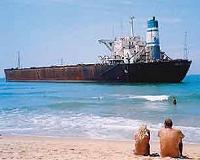| . |  |
. |
Klaipeda, Lithuania (AFP) Sept 9, 2010 The deck of a Lithuanian mine-sweeper shakes as a blast rips below the Baltic Sea, sending a geyser of water rising into the sky. Ships from seven other Baltic navies, plus their counterparts from Belgium and France, have stepped in to help Lithuania tackle an enduring legacy of World Wars I and II, when both sides littered the sea with mines. The two-week Operation Open Spirit, which ended this week, was the latest in a long drive to clear the potentially deadly devices from the Baltic. The task is painstaking. According to Baltic militaries, an estimated 80,000 unexploded mines remain in the Baltic, mostly laid by Nazi Germany and the Soviet Union during World War II. Only a few are located during regular sweeping operations. In addition, some 40,000 tonnes of chemical weapons were dumped in the sea after the war, according the Helsinki Commission which groups Baltic nations. Around 2,000 tonnes of chemical weapons remain in Lithuanian territorial waters said Klevas Tubys, head of its naval data department. On board the Suduvis, another Lithuanian mine-sweepers, in total darkness, five navy members scan the depths on-screen. A sonar device on the prow picks up objects some 30 metres (100 feet) below. Sergeant Aivaras Rimkus has learned to read the points of light on his display, picking out mines. "A sonar signal sent back by a mine is very strong, and the point of light flashes brightly on screen," he told reporters after having finished his duty. Most of the time, however, the discovery needs to be confirmed by a robot equipped with a camera. "We've found all kinds of things down there. Even refrigerators," said Rimkus, grinning. If the object is indeed a mine, the robot places an explosive on it which is set off remotely from the vessel. A total of 160 square kilometres (99 square miles) were swept in Operation Open Spirit, and seven mines were neutralised. "Since international mine-sweeping operations began in 1997, a total of 143 mines have been discovered," said Lithuanian military spokesman, Antanas Brencius. Lithuania's military resources would be over-stretched if it carried out such operations alone. The nation of 3.3 million built its forces from scratch after breaking free from the crumbling Soviet Union in 1990. The Red Army only left the region in 1994, and Lithuania plus formerly Soviet-ruled neighbours Estonia and Latvia joined NATO and the European Union in 2004. The Suduvis did not locate any mines this year. But for its commander, Lieutenant Rimantas Preimantas, that was good news. "Not finding anything is actually positive, because it means the zone is clean," he explained. Further north, in Estonian waters, vessels involved in a 2009 operation found 64 unexploded mines. Lithuania's President Dalia Grybauskaite has announced plans for a formal appeal before the United Nations for more help to solve the problem.
Share This Article With Planet Earth
Related Links Our Polluted World and Cleaning It Up
 Goa ordered to remove wrecked ship from tourist beach
Goa ordered to remove wrecked ship from tourist beachPanaji, India (AFP) Sept 8, 2010 An Indian court on Wednesday gave the government in the resort state of Goa two months to begin removing the rusting hulk of a ship that ran aground on a popular tourist beach a decade ago. Two judges at the Goa bench of the Bombay High Court told the authorities they had until June to tow away the MV River Princess, which hit the coast of north Goa during storms in 2000. The giant iron ... read more |
|
| The content herein, unless otherwise known to be public domain, are Copyright 1995-2010 - SpaceDaily. AFP and UPI Wire Stories are copyright Agence France-Presse and United Press International. ESA Portal Reports are copyright European Space Agency. All NASA sourced material is public domain. Additional copyrights may apply in whole or part to other bona fide parties. Advertising does not imply endorsement,agreement or approval of any opinions, statements or information provided by SpaceDaily on any Web page published or hosted by SpaceDaily. Privacy Statement |